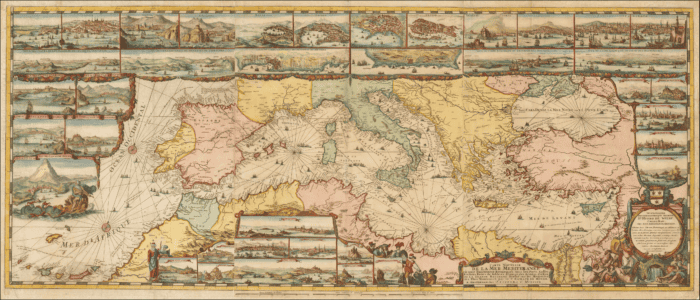Published
Trade in the Great Sea: Revisiting EU-Southern Mediterranean Trade Relations
By: Jan A. Micallef
Subjects: Africa European Union Regions Russia & Eurasia
 Image: Romeyn de Hooghe, Public domain, via Wikimedia Commons
Image: Romeyn de Hooghe, Public domain, via Wikimedia Commons
The Mediterranean region may currently not be a central geography for EU trade policy. As the EU’s attention lies on issues such as the trade policies of the US and China and the state of the international trade order, mainstream trade-policy interest in the Mediterranean has fallen by the wayside. There are developments on energy cooperation but when the Mediterranean is in the headlines nowadays, it is usually because of migration, political instability or the situation in the Middle East.
Still, the Mediterranean region is important for trade. David Aboulafia used the term “The Great Sea” as a title for his book on the history of the Mediterranean Sea. This title is fitting due to the Mediterranean’s rich history as a cradle of civilisation and as a region with a long tradition of economic exchanges. Yet, beyond its history, the Mediterranean is still a key region with which the EU is bound. It remains important up till this day and will remain so in the future.
There are various international actors that are interested in non-EU Mediterranean countries. In theory they can engage economically with these countries in a beneficial way for all parties involved. Up to a certain extent they are already doing so with positive results. However, they are sometimes more interested in gaining a political foothold in those countries, rather than in trade per se.
In the end it is the EU that is best placed to harness the economic potential of the region. This is due to the economic weight of the bloc, the geographical proximity and the ties that already exist between EU Member States and Mediterranean countries.
EU-Mediterranean trade relations enjoyed a boost in the mid-1990s with the birth of the so-called Barcelona Process. This momentum slowly culminated in the birth of new initiatives, such as the Union for the Mediterranean in 2008, which had a strong trade policy element to them. However, clouds then started appearing on the horizon. When the initial shocks of the 2008 financial crisis started settling, the whole rationale behind the liberal economic order and open trade started being questioned. In 2011 the region encountered a watershed moment in the form of the Arab Spring. With a few exceptions, the outcome of this revolution was political instability that persists up till this day. From this point onwards the EU’s political focus on trade also started being pulled elsewhere by the gravity of events. The EU had to deal with the Trump administration and its destructive policies on trade, Brexit, the COVID-19 pandemic and China’s increasing assertiveness and unfair trade practices. Then came the invasion of Ukraine by Russia and the latest crisis in Israel and the Palestinian Territories. With so much on its plate and the negative political conditions in some of the non-EU Mediterranean countries, there was not much that could be done to take trade relations forward.
EU-Mediterranean trade relations hold a lot of potential and a properly functioning trade policy can bring considerable economic benefits. These benefits would also do a lot to solve some of the problems that plague Mediterranean countries (such as unemployment, political instability and poverty), leading to a better situation also for the EU. EU-Mediterranean trade relations are therefore worth working for and deserve being brought back to the fore.
It is in this context that a brief study on these relations is being published in the form of two ECIPE policy briefs. The first study focused on the so-called Southern Neighbourhood countries, which incorporate Algeria, Egypt, Israel, Jordan, Lebanon, Libya, Morocco, Syria, Palestine, Syria and Tunisia. It looks at the state of play of these trade relations. It gives a brief historical background, reviews the current trade instruments that apply and tries to evaluate whether any benefits have ensued till now. The second brief, which will be published at a later stage, will evaluate how the trade policy of the two sides has been lacking, how it can be improved to allow trade’s full potential to be reached and what challenges there are to execute the improvements needed.
The study will point to the fact that economic benefits did ensue from the current trade regime. However, the region is still far from reaching its full trade potential and an upgrade of the applicable trade instruments is sorely needed, even though any step in this direction would entail considerable challenges. The study will also show that, although the Mediterranean region might currently be at the very back of political burners, a lot of work has been ongoing at lower and technical levels.
It is unreasonable to expect this topic to suddenly climb to the top of the EU’s trade agenda. However, this study could hopefully serve as a means to revisit EU-Mediterranean trade relations and kindle some discussion on how to take them forward.